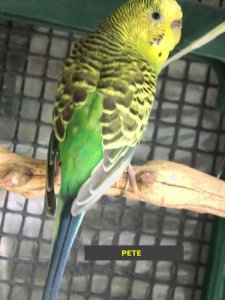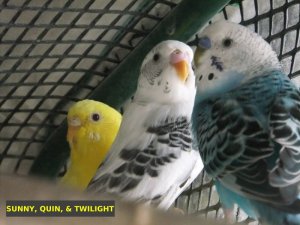Wild budgies eat a variety of seeds (grass seeds), fruits, berries, and vegetation. They feed on or near the ground. What they eat varies with food availability during different seasons.
Seeds
Wild budgies eat a great variety of seed types as different plants come into season. Commercial seed mixes generally contain from 2 - 8 different kinds of seeds. However, they tend to be high in fat and carbohydrates, low in protein and lacking essential vitamins and minerals. Ultimately, if fed only seed, this could lead to ill health in your budgie and potentially shorten its life. A budgie will often selectively eat only 1 or 2 of its favorite types of seed. Millet seed, or millet spray/branches, are often chosen preferentially, and these seeds are deficient in many nutrients. Honey sticks are often also offered as well, but once again, these are simply seeds that are stuck together with sugar and honey and are similarly nutrient-deficient
. Molting foods, song foods and conditioning foods are simply different combinations of more seeds that are nutritionally incomplete. Healthy molts, vibrant song, and strong condition are achieved in birds fed a balanced diet year-round.
Because seeds are nutritionally incomplete, lacking vitamins, minerals, and protein, they should only be a very small part of a budgie’s diet and should
never be the entire diet.
If you gradually offer your bird fewer seeds, replacing them with healthier options such as fortified pellets and a limited amount of fresh table food, your bird will eventually start eating more of other properly balanced diets.
Diets
The recommended diet for budgies is a pelleted food formulated for birds. Several commercial brands of pellets are available in different shapes, sizes, and colors.
Pellets have been developed to meet all your bird's nutritional needs. Hand-raised babies should be started on pelleted diets. It may be difficult to convert mature budgies to pelleted diets. Different formulations are available for different life stages and for the management of certain diseases. Pellets are the
ideal diet; therefore, seed-eating birds should be slowly weaned off seeds onto a pelleted diet. Pellets should represent approximately 75-80% of the bird's diet.
How do I convert my bird to a pelleted diet?
Some birds are more difficult than others to transition on to pellets. Seek out the advice of a veterinarian familiar with birds to get tips on how to make this transition easier. Initially, birds may not even recognize pellets as food. Pellets should be offered straight, not mixed with seed, or the bird will simply pick around the pellets to get the seed. Pellets should be offered first thing in the morning, before other food, when the bird is hungriest. Since budgies eat off the ground in the wild, you may mimic this behavior by spreading the pellets over a flat surface and encouraging the bird to walk through them. You can also flick each pellet between your thumb and pointer finger and tap on the table top as if your fingers were a beak investigating the pellets. You can also grind the pellets up into a fine powder that you can sprinkle on to a very small amount of any moist food (vegetables, fruit, cooked egg, pasta) that your bird likes to eat. If the bird eats the pellet-coated food, you can gradually grind the pellets into larger chunks and mix them with smaller amounts of moist food over time so that ultimately you are offering nearly all pellets with minimal amounts of moist food mixed in. It may take days, weeks, or months to modify a bird's diet. If the bird is slow to take to pellets, you may offer a small amount of seed or fruits and vegetables later in the day. Seeds may be withdrawn completely only when you are sure the budgie is eating the pellets plus some fruits and vegetables. This can be a stressful time for you and your budgie, but with patience, you can transition your bird from an unhealthy seed diet to a balanced pellet-based diet.
Fruits and Vegetables
Fruits, vegetables, and greens should account for no more than 20 - 25% of the daily diet. Pale vegetables, with a high water composition (e.g., iceberg or head lettuce and celery) offer very little nutritional value.
Avocado is reported to be potentially toxic and should never be offered to a bird.
Fruits and vegetables must be washed thoroughly to remove chemicals and should be cut into small pieces appropriate to the size of the bird. It is not necessary to take the skin off. Offer fruits and vegetables in a separate dish. If your bird appears to develop a particular fancy for one food item, reduce its volume, or stop feeding it temporarily, to promote consumption of other foods. Fruits and vegetables should be left in the cage for no more than a couple of hours, particularly in warm climates, or they may spoil.
Water
Fresh clean water must be available at all times. Depending on the quality of your tap water, you might consider the use of bottled water. Dishes must be cleaned thoroughly every day with soap and water.
What about people food?
As a rule, any wholesome, nutritious food that you and your family eat your bird can eat, but in very small quantities (a thumbnail size amount for a budgie is equivalent to a dinner plate size portion for a person and is appropriate). Follow the general guidelines discussed above regarding fruits and vegetables. Some birds even enjoy a small amount of lean cooked meat, fish, cooked egg, or very small amounts of cheese occasionally. Dairy products should be consumed in moderation, as birds are lactose-intolerant. Very salty foods (chips, pretzels, popcorn), chocolate, products containing caffeine (coffee, tea, soda), and alcoholic beverages should never be fed to your budgie.
Will my bird have any different needs throughout its life?
Birds that are extremely young, stressed, injured, laying eggs, or raising young may have certain special nutritional requirements. There are specially formulated pelleted foods available for birds with specific nutritional requirements. Consult your veterinarian regarding these situations.
Does my bird need extra vitamins, minerals or amino-acids?
Your veterinarian can help you assess your bird's diet and its particular needs. In general, a bird that is eating 75 - 80% of its diet in the form of pelleted food does not need supplements. Specific vitamins or minerals may be more important at various times during a bird's life (e.g., egg laying requires calcium supplementation). Various vitamin and mineral supplements, as well as omega fatty acid supplements, are available for birds and should only be given under the guidance of a veterinarian knowledgeable about birds.
Birds on all-seed diets may be given powdered supplements until they are transitioned to a pelleted diet. Placing these powders on the outside of seeds is of little value since budgies remove the outer hulls from seeds before ingesting them. Small amounts of powdered vitamin supplements may be administered on moist food, but are generally not necessary once the bird has been converted to pellets.
Does my bird need gravel or grit?
Budgies do not need gravel or grit because they remove the outer hull of the seed before ingesting the kernel. Previously, it was believed that grit was necessary for the mechanical breakdown of food in the gizzard, as an aid to digestion. However, now we know that only birds like pigeons and doves that consume seeds whole, without removing the outer hull, need gravel to help them digest. Some budgies, will in fact, overconsume grit when it is offered and develop gastrointestinal tract obstructions that are potentially life threatening. Thus, grit and gravel should not be offered to budgies.
What pointers should I remember about feeding my budgie?
Always monitor the amount of food eaten every day by each bird.
Offer fresh water every day.
Offer a variety of fresh foods, such as small amounts of fruits and vegetables, every day.
Clean all food and water dishes daily.
No to a food item one day does not mean
no forever - KEEP TRYING!
Some suggested food items include:
apple, cherries (not the pit), peaches, apricots, Chinese vegetables (bok choy), pear, asparagus, coconut, peas, banana, corn, peppers (red/green & hot), beans (cooked) cucumber, pineapple, chick, peas, dates, plum, dandelion leaves, pomegranate, lentils, dates, potato, lima, endive, pumpkin, fig, grapes, raspberry, grapefruit, rice (brown), beet, kale, romaine lettuce, blueberry, kiwi fruit, spinach, broccoli, melons, sprouted seeds, Brussel's sprouts, mango, squash, cabbage, nectarines, strawberry, cantaloupe, orange, sweet potato, carrot, papaya, tomato, carrot tops, parsnip, zucchini.
https://vcahospitals.com/know-your-pet/budgies-feeding





